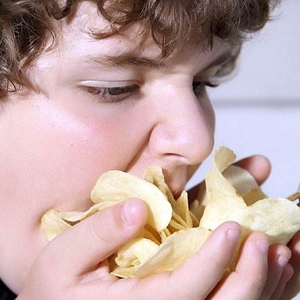The UK has a severe obesity problem: One out of every three kids leave primary school overweight or downright obese. And it’s in the primary school years that kids generally form the eating habits and food preferences that they take with them the rest of their lives…
 Pizza has a bad rep for being ‘unhealthy’ and ‘fattening’. I say, it all depends
Pizza has a bad rep for being ‘unhealthy’ and ‘fattening’. I say, it all depends
on how much you eat of what kind of Pizza. At least one dietary expert
I’ve heard from maintains that one slice of a ‘supreme’ pizza –
with as many veggie toppings as meat and cheese –
can make a healthy meal. Even breakfast!
So it should come as no surprise that the UK government has passed new regulations banning junk food ads on TV before 9 p.m., and on the Internet all together. (The ban won’t stop manufacturers from advertising their products on their own websites, though.)
“The content youngsters see can have an impact on the choices they make and habits they form,” UK Public Health Minister Jo Churchill said on Thursday. “With children spending more time online it is vital we act to protect them from unhealthy advertising.”
Surveys showed that almost half of all TV ads aired each month in the UK in 2019 were for ‘unhealthy’ food.
Mixed reaction
The announcement of the bill’s passage in Parliament triggered both praise and condemnation, from predictable quarters.
The medical community and health advocates expressed joy at the advent of restrictions on junk food advertising (which will come into effect next year). But the media and junk food manufacturers were ‘dismayed’ at that action.
Media organisations – fearing a serious drop in ad revenues – claimed no clear link had been found between advertising and childhood obesity.
“Instead of tackling the problem of childhood obesity, this draconian measure will harm news media publishers who rely on advertising revenue to fund the journalism which keeps us all informed,” the UK News Media Association spokesperson Sayra Tekin said.
Draconian? I don’t know about that. Such measures (with greater or lesser degrees of severity) have been enacted in other countries without doing great harm to the media interests there. In fact, shares of ITV, UK’s largest commercial broadcaster, fell only 1 percent by the end of the day, and other big, publicly traded media outlets fell no more than 2 percent.
It’s also worth noting that a ‘sugar tax’ instituted in 2018 did result in some soft drink (soda) manufacturers reducing their sugar content.
My take
Sugar taxes imposed in other jurisdictions (primarily in the U.S.) have produced similar results to the UK sugar tax. Bur it’s hard to tell if they’ve resulted in any significant reduction of childhood obesity. Nevertheless, they’ve been welcomed by healthy eating advocates as a positive step.
As for the ad ban – I have a feeling it will produce quantifiable results in the fight against fat kids. But it’s going to take more than that to win the war. I hope parents will take responsibility for the health and welfare of their kids and ban sugary cereals from their homes. They also need to create an emphasis on whole grain products at breakfast. Simply banning plain white bread all day would go a long way to enhancing a kid’s diet. And I hope they encourage their kids to reach for an apple, or a handful of celery or carrot sticks, rather than a candy bar or a bag of cookies, at snack time.
How do you feel about the UK ban on junk food ads? Would you like to see the Canadian and U.S. federal governments do the same thing? Or do you believe that the government has no place in the pantries of the nation?
Definitely something to muse on…
~ Maggie J.

